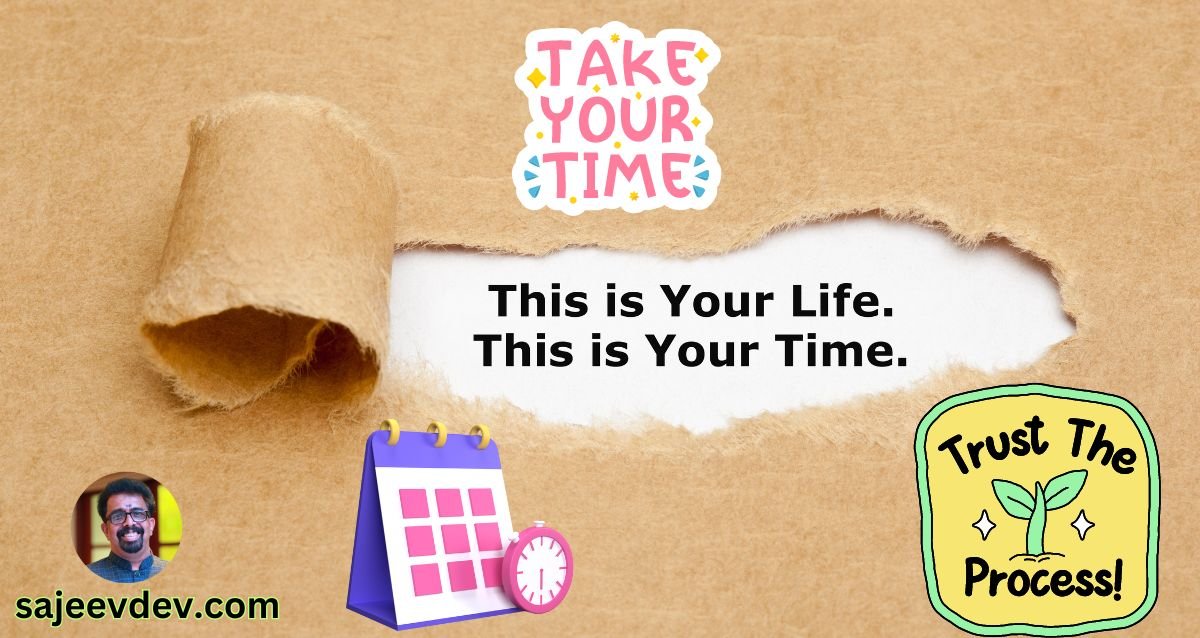Understanding Life’s Timing
In the fast-paced world we inhabit, the notion of trusting the timing of our lives can often seem counterintuitive. Society frequently emphasizes immediate results and quick successes, leaving little room for patience. However, it is vital to recognize that life unfolds in its own rhythm, governed by unique circumstances that may not always align with our aspirations. Embracing this concept of life’s timing can lead to deeper reflections and ultimately a more fulfilling journey.
It is essential to acknowledge that many individuals have encountered moments when their plans did not manifest as expected. These instances can be frustrating, leading to feelings of disappointment or even despair. Yet, it is within these challenging times that valuable lessons and unexpected opportunities often arise. Through introspection, one may recall situations where an initial setback later paved the way for greater achievements, personal growth, or improved circumstances. These experiences illustrate how trusting life’s timing can be beneficial.
Moreover, understanding that life operates on its own schedule helps alleviate stress and anxiety. When we accept that each stage of life has its purpose and timing, we create space for reflection and growth. This acceptance encourages individuals to take a step back, allowing them to appreciate the present moment rather than fixating solely on future goals or expectations. By embracing the natural flow of life’s progression, we cultivate resilience and adaptability, virtues that become increasingly crucial in an unpredictable world.
As we navigate our journeys, it is important to cultivate a mindset that honors the process of life. Whether through personal anecdotes or shared experiences, each reflection on the complexities of timing can deepen our understanding of ourselves and enhance our ability to trust the timing of our lives.
The Myth of Immediate Gratification
In contemporary society, there exists a pervasive expectation for immediate results and success, largely fueled by advancements in technology and the rapid pace of life. The proliferation of instant communication, fast food, and on-demand entertainment has cultivated an environment where the notion of patience feels increasingly foreign. Within this context, the myth of immediate gratification has taken center stage, creating societal pressures that compel individuals to seek swift solutions in every aspect of their lives.
Many people find themselves under constant pressure to achieve their goals quickly, amplifying feelings of frustration and self-doubt when faced with obstacles along their journey. This urgency is deeply embedded in modern culture, where success is often showcased through the lens of rapid achievement, whether it be in personal development, career advancement, or financial prosperity. The allure of quick fixes can lead individuals to chase shortcuts, often disregarding the value of a well-thought-out strategy that emphasizes steady progress.
However, embracing a long-term vision and cultivating patience can serve as powerful counterbalances to the desire for instant results. The journey toward meaningful achievements is typically characterized by incremental growth and learning, underscoring the importance of resilience. Instead of succumbing to the seductive promise of quick success, individuals can benefit from setting realistic expectations and appreciating the process involved in their pursuits. By recognizing that lasting success often requires persistence and dedication, one can build a more sustainable and fulfilling life.
Ultimately, learning to trust the timing of your life means acknowledging that worthwhile journeys often unfold gradually. Fostering patience allows individuals to develop a deeper appreciation for their experiences, leading to personal growth and a greater sense of fulfillment. With a commitment to long-term goals, individuals can navigate the complexities of their paths, equipped with a clearer understanding of the real rewards that come from dedication and perseverance.
Every Journey is Unique
It is an undeniable truth that each individual’s life journey is profoundly distinctive, shaped by an array of experiences and personal choices. While societal norms often dictate a timeline for achieving various milestones—such as education, career advancement, and family life—real-life examples reveal that the paths taken can vary widely and still lead to fulfillment and success. Each person navigates their unique set of challenges, opportunities, and aspirations, emphasizing that there is no single roadmap to happiness or achievement.
Consider the story of two friends, Sarah and John, who graduated from college at the same time. Sarah immediately entered the corporate world, quickly climbing the ladder in a prestigious firm. On the other hand, John chose to travel and explore different cultures before settling into a career that reflected his passions. While Sarah seemed to achieve success by conventional standards, John found immense personal growth and clarity during his travels. Although their journeys differed significantly, both ultimately arrived at contentment in their lives, illustrating that personal experiences should not be measured against the timelines of others.
This notion of individuality extends beyond career choices. Take the case of Emma, who faced significant health challenges during her early adulthood. While her friends moved forward with typical life events, Emma devoted time to her recovery and self-awareness. By embracing her unique experiences, she emerged with a renewed sense of purpose that ultimately inspired her to advocate for health awareness. Emma’s journey underscores the importance of recognizing that life’s timing is not uniform; rather, it is an intricate tapestry woven from a multitude of threads that signify our personal growth.
In confronting the societal pressures that often accompany conventional timelines, individuals can cultivate greater self-acceptance and patience. Celebrating each person’s journey allows for a richer understanding of the diverse paths that lead to fulfillment. Remember, comparing oneself to others can obscure the beauty of one’s unique story, while embracing individuality fosters a more genuine and meaningful life experience.
Cultivating Patience: Strategies for Mindfulness
Patience is a vital skill that can significantly enhance our quality of life by promoting mindfulness and a deeper appreciation of our journey. To cultivate patience effectively, one can incorporate various practices that encourage present-moment awareness and acceptance. Meditation is one such powerful technique. By dedicating a few minutes each day to sit quietly and focus on the breath, individuals can anchor themselves in the present, allowing thoughts to drift away without judgment. This practice not only fosters inner peace but also nurtures a greater sense of patience as individuals learn to embrace moments of discomfort and uncertainty.
Journaling serves as another practical strategy for cultivating patience in daily life. By documenting thoughts and experiences, individuals can reflect on their progress and feelings, providing clarity on their journey. Journaling allows the mind to unwind and can also highlight patterns of impatience, giving one the opportunity to develop more patient responses in similar future situations. As one explores personal experiences through writing, the understanding of their growth over time becomes more apparent, reinforcing the idea that small, incremental progress is worthy of acknowledgment and celebration.
Setting realistic goals is essential in fostering patience and mindfulness. It is crucial to break down larger objectives into manageable tasks, which not only makes them less daunting but imparts a sense of accomplishment as each step is completed. This method encourages individuals to savor their achievements, reinforcing the value of patience as they move away from a hurried mindset. By focusing on the present and acknowledging the journey rather than fixating solely on the end goal, individuals can cultivate a more fulfilling and patient life experience.
Trusting the Process: Real-Life Success Stories
Throughout history, numerous individuals have exemplified the importance of trusting the process and embracing patience as they navigated the path to their success. These stories serve as powerful reminders that fulfillment often comes from a series of persistent efforts rather than a sudden breakthrough.
One such inspiring narrative is that of J.K. Rowling, the author of the beloved Harry Potter series. Before achieving worldwide acclaim, Rowling faced numerous rejections from publishers, experiencing hardships and personal struggles, including periods of poverty. However, she remained committed to her writing, believing in the eventual success of her work. It was only after years of perseverance that she finally published the first book in the series, which went on to sell millions of copies globally and create a cultural phenomenon. Rowling’s journey illustrates how trusting the timing of one’s efforts can lead to transformative outcomes.
Another compelling story is that of Oprah Winfrey, a media mogul whose journey to success was not without challenges. Born into poverty and facing numerous adversities throughout her youth, Winfrey encountered significant obstacles on her path to prominence. Yet her determination enabled her to secure a position in broadcasting, and she eventually built a platform that resonated with millions. Winfrey’s story showcases how consistent hard work combined with trust in the timing of life’s unfolding events can yield extraordinary results.
These examples resonate with many who may feel disheartened by their own slow progress. The narratives of Rowling and Winfrey underscore the notion that success is rarely an overnight achievement. Instead, it is often the culmination of unwavering belief in oneself, diligent effort, and an ability to embrace the journey, irrespective of time constraints. Trusting the process, as highlighted by these stories, can inspire readers to remain patient as they pursue their own goals.
Overcoming Obstacles: Dealing with Setbacks
Throughout life’s journey, individuals often encounter various setbacks and obstacles that can derail plans and diminish motivation. However, it is crucial to embrace these experiences not as failures but as invaluable opportunities for personal growth and resilience. Acknowledging that obstacles are a natural part of life can significantly alter one’s perspective, transforming adversity into a catalyst for development.
Viewing setbacks as challenges to be addressed rather than insurmountable barriers fosters a positive mindset. When faced with an obstacle, it is helpful to assess the situation critically. This involves identifying the specific factors contributing to the setback and pondering what can be learned from it. For instance, reevaluating goals, strategies, and resources can lead to a deeper understanding of oneself and one’s aspirations. Often, individuals unearth strengths and capabilities they previously overlooked, resulting in personal empowerment.
Resilience is a fundamental trait necessary for navigating life’s inevitable ups and downs. Cultivating resilience can be achieved through various methods, such as practicing mindfulness, which promotes self-awareness and emotional regulation. Engaging in positive self-talk and surrounding oneself with supportive relationships can also help maintain motivation in the face of challenges. These tools empower individuals to find silver linings amid adversity, reinforcing the understanding that setbacks can lead to new pathways and opportunities.
Moreover, sharing experiences with others who have faced similar challenges can foster a sense of camaraderie and belonging. Recognizing that many people encounter obstacles allows one to feel less isolated and more equipped to tackle their unique hurdles. Ultimately, focusing on the learning experiences derived from setbacks lays the groundwork for a more resilient and adaptive approach to life’s journey, paving the way for future successes.
The Role of Faith in Your Journey
Faith, whether rooted in spirituality or personal conviction, serves as a vital component in navigating the complexities of life. It fosters resilience and encourages individuals to accept the ebb and flow of experiences that shape their existence. When faced with adversity or uncertainties, having faith can provide solace and strength, reinforcing the notion that there is a larger narrative at play, one that transcends immediate circumstances.
This belief in a bigger picture allows individuals to relinquish the illusion of control over specific outcomes. Recognizing that timing may not align with personal expectations can be disheartening; however, faith acts as a buffer against despair. It motivates individuals to trust that events will unfold as intended, even if the path is obscured. Whether it is faith in a divine plan or a personal journey of growth, such conviction can create a sense of peace amidst chaos.
Moreover, faith can be immensely grounding during periods of waiting and uncertainty. It encourages individuals to cultivate patience, fostering an inner strength that becomes indispensable when faced with the trials of life. By trusting the timing of life, individuals may find that opportunities arise when they are most prepared to embrace them, highlighting the interconnectedness of personal development and external circumstances.
Incorporating faith into one’s journey also involves embracing vulnerability, allowing individuals to acknowledge their fears and doubts. This acceptance fosters a healthy mindset, essential for personal growth. Ultimately, whether through spirituality or personal belief systems, faith remains a cornerstone in understanding and accepting the unpredictable nature of life, affirming the necessity of patience in the grand tapestry of existence.
The Importance of Self-Compassion
Self-compassion plays a critical role during periods of waiting and uncertainty in life. When individuals find themselves navigating challenges, it is essential to extend the same kindness and understanding to oneself that they would offer a close friend. Practicing self-compassion allows individuals to acknowledge their feelings without judgment and to accept that struggle is a fundamental aspect of the human experience. This practice reinforces the belief that one’s worth is not conditional on external timelines or outcomes but is inherent and stable.
One practical approach to cultivating self-compassion involves engaging in positive self-talk. Instead of succumbing to self-criticism during moments of dissatisfaction or impatience, individuals can replace negative thoughts with affirming ones. Phrases such as “It is okay to feel this way” or “I am doing my best” can help foster a gentler inner dialogue. Additionally, mindfulness meditation can be a valuable tool, as it encourages individuals to observe their thoughts and feelings without becoming entangled in them. This non-judgmental awareness can significantly reduce feelings of anxiety associated with waiting.
Another effective method to reinforce self-compassion is through journaling. Writing about one’s experiences offers a chance to clarify feelings and challenges, enabling individuals to reflect on their personal journeys without harsh judgment. By documenting thoughts, emotions, and experiences, readers can gain insights and affirm their progress, no matter how small it may seem. Furthermore, sharing experiences with supportive friends or communities can also help cultivate a sense of belonging and understanding, making the journey feel less isolating.
Ultimately, embracing self-compassion during times of waiting and uncertainty empowers individuals to navigate their life journeys with greater resilience and grace. By treating oneself with kindness, the path may become less daunting, and the lessons learned along the way can be acknowledged and celebrated.
In reflecting upon the significance of trusting the timing of your life, we highlight the importance of understanding that personal journeys are unique to each individual. Everyone navigates through their own distinct experiences, challenges, and milestones at varied paces
In reflecting upon the significance of trusting the timing of your life, we highlight the importance of understanding that personal journeys are unique to each individual. Everyone navigates through their own distinct experiences, challenges, and milestones at varied paces. Recognizing this variation is crucial as it fosters a sense of acceptance and patience. Many people may find themselves comparing their progress to others, which can lead to feelings of inadequacy and self-doubt. However, it is essential to shift this mindset and appreciate the distinct path you are on.
Embracing your unique timeline involves recognizing that every setback and delay can serve as a valuable lesson and is an integral part of personal growth. The key takeaway is to have faith in your particular journey and cultivate the belief that everything unfolds as it should. This perspective allows for greater emotional resilience, enabling you to navigate life’s ups and downs with a sense of calm. Patience serves not just as a tool for enduring difficult times but also as a means to fully appreciate the highs of life when they occur.
As you progress on your journey, remember to practice self-compassion and acknowledge the effort you invest in achieving your aspirations. The process may be slow, but it is imperative to trust that each step—however small—contributes to your overall development. Personal fulfillment often comes from honoring your timeline rather than racing toward an arbitrary destination. By doing so, you embrace not only patience but also the beauty of your unique story, reinforcing the notion that trusting the timing of your life can lead to a deeper understanding and appreciation of yourself.



